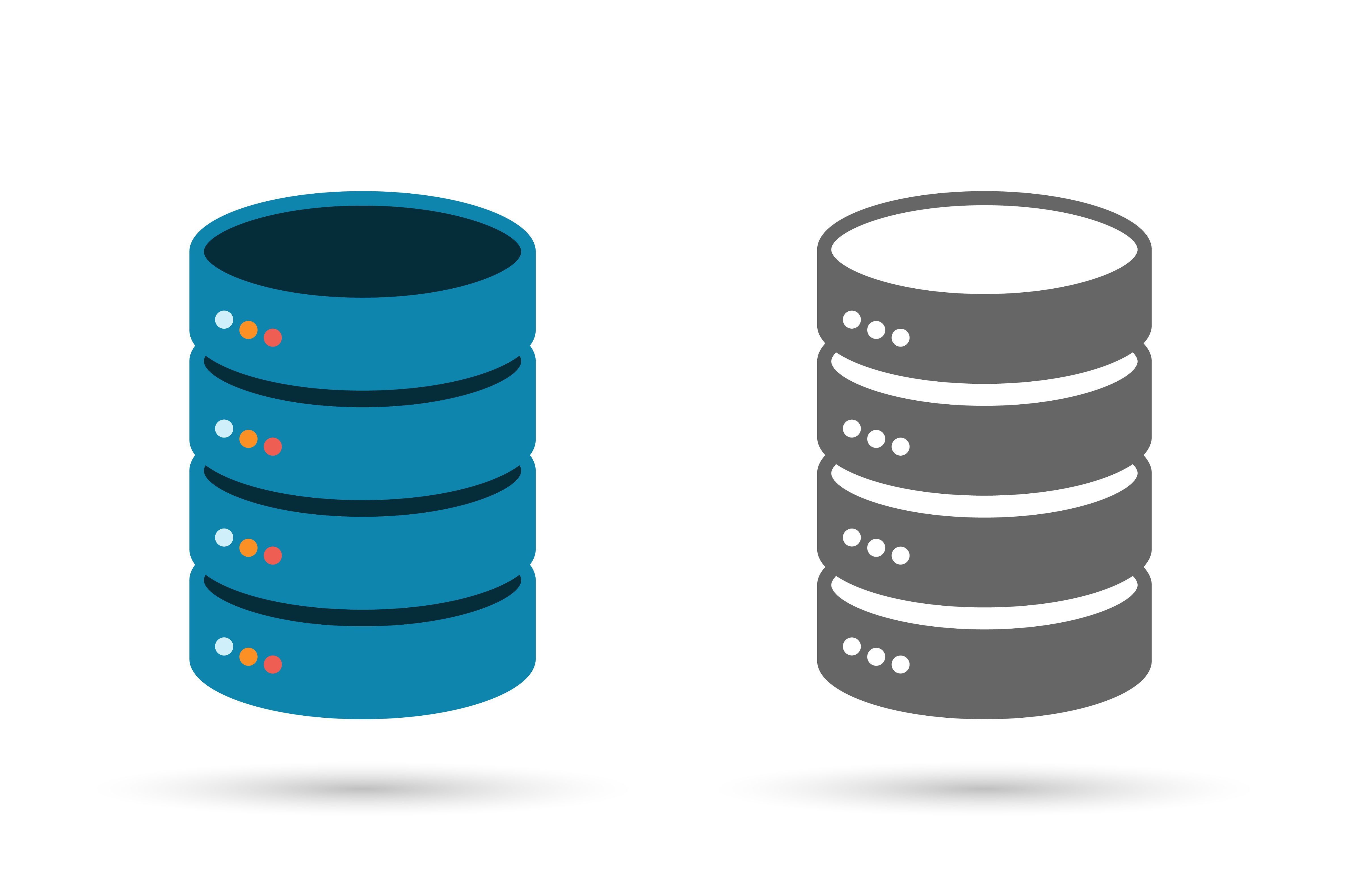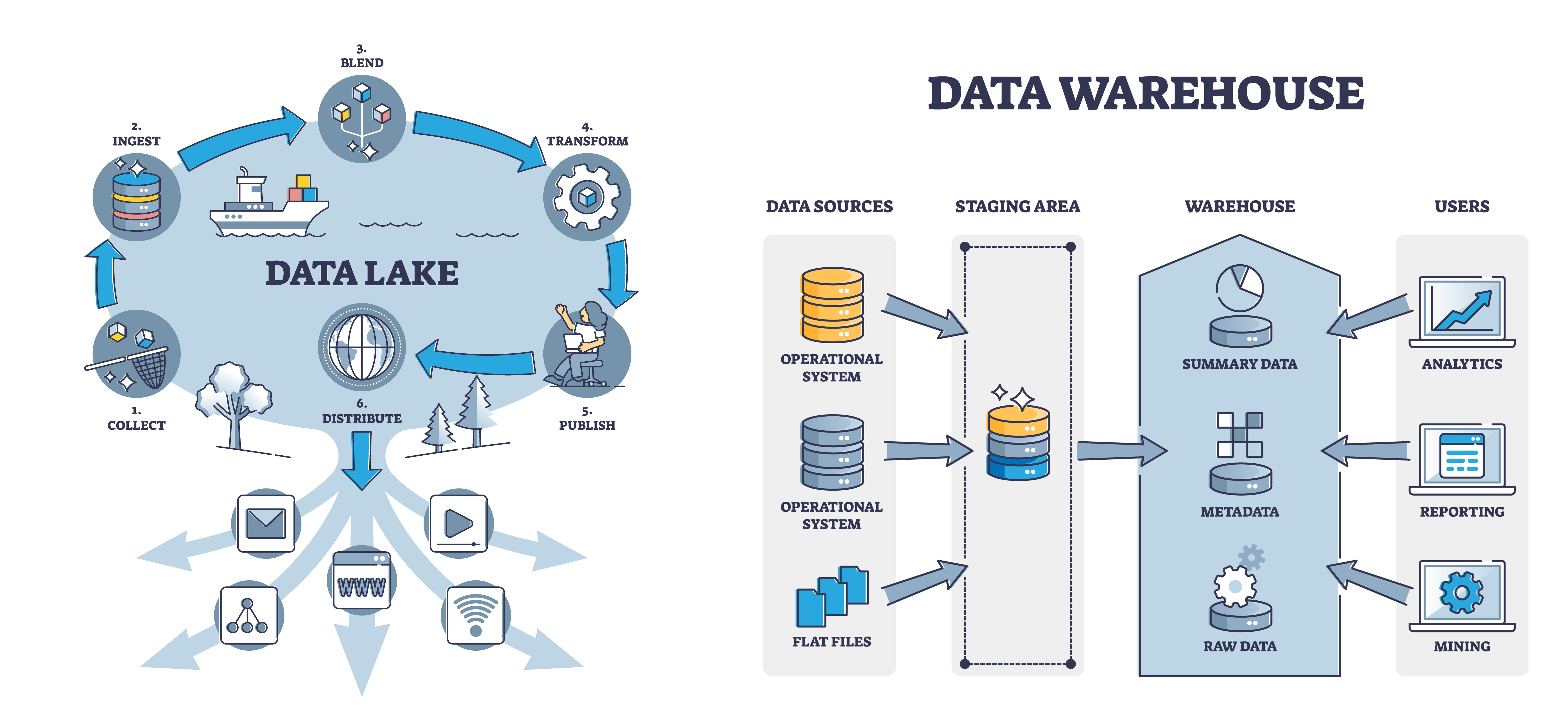
In the rapidly evolving world of big data and analytics, businesses are increasingly faced with the challenge of choosing the right data storage solution that aligns with their unique requirements. Understanding the nuanced differences between data lakes and data warehouses is crucial for making an informed decision. This article delves deep into these two storage options, dissecting their uses, benefits, and how they can serve as the backbone of a data-driven business strategy.

Introduction to Data Storage Solutions
Advancements in technology have led to an unprecedented surge in the amount of data generated by businesses. This deluge of data has necessitated the development of sophisticated data storage solutions. Before diving into the specifics of data lakes and data warehouses, it is important to understand the broader context of data storage.
Data storage solutions are designed to accommodate the vast amounts of data created daily by individuals and businesses. These solutions not only store data but also provide mechanisms for retrieval, management, and analysis. The right storage solution can transform raw data into actionable insights, thus becoming a key asset for any organization.
As we move forward, it's critical to recognize that data storage is not a one-size-fits-all scenario. Different types of data and the various ways in which it is utilized dictate the need for different storage solutions. It is within this landscape that data lakes and data warehouses have emerged as prominent options.
What is a Data Lake?
A data lake is a centralized repository that allows for the storage of structured, semi-structured, and unstructured data at any scale. It is designed to store vast amounts of raw data in its native format until it is needed. Unlike a hierarchical data warehouse, which stores data in files or folders, a data lake uses a flat architecture to store data.
One of the most significant aspects of a data lake is its flexibility. Since data can be kept in its raw form, it doesn't require a predefined schema. This means businesses can store all their data without having to first structure it, allowing for more agility in dealing with various types of data.
The concept of a data lake is relatively new but has become increasingly popular due to its adaptability and the growing need for businesses to leverage big data. The ability to store massive amounts of diverse data makes data lakes an attractive option for many organizations looking to capitalize on the potential of their data.
Uses for Data Lakes
Data lakes are versatile in their application, supporting a wide array of data analytics activities. They are particularly beneficial for big data processing, machine learning, and real-time analytics. With a data lake, organizations can run analytics on different types of data, from logs and XML files to social media data and images.
Another use for data lakes is in data discovery and profiling. Analysts can explore vast amounts of data to uncover patterns, trends, and insights. This is especially useful for businesses that are in the early stages of data analysis and want to experiment with their data without the constraints of a structured environment.
Furthermore, data lakes support advanced analytics through their ability to handle large-scale data processing jobs. They are engineered to work with big data technologies such as Hadoop, Spark, and NoSQL databases, which are instrumental in data mining, predictive modeling, and statistical analysis.
What is a Data Warehouse?
Shifting focus to a more structured approach to data storage, a data warehouse is a centralized system for storing, reporting, and analyzing structured data from various sources. Data warehouses are designed to query and analyze data, rather than just storing it. They are structured in a way that data is cleaned, enriched, and transformed into a standardized format, making it readily accessible for business intelligence purposes.
A defining characteristic of a data warehouse is its schema-on-write approach. Before data can be stored in a data warehouse, it must conform to a predefined schema, which means that the data needs to be organized into tables and columns with defined data types.
Data warehouses have been the traditional choice for businesses looking to perform complex queries and generate reports. They are optimized for speed and efficiency in data retrieval, making them ideal for situations where performance is a priority.
Uses for Data Warehouses
Data warehouses serve as the backbone for business intelligence (BI) operations. They provide a stable and reliable platform for running high-speed analytics and generating reports. Since the data in a data warehouse is already processed and formatted, users can trust the accuracy and integrity of the data for decision-making purposes.
One of the primary uses for data warehouses is for historical data analysis. Being able to look back at historical data trends helps businesses to forecast future events and make strategic decisions. Data warehouses excel at managing time-series data and supporting complex queries that span large data sets.
Another use for data warehouses is to power user dashboards and performance scorecards. These tools help visualize data, allowing users to track key performance indicators (KPIs) and get a snapshot of business performance at a glance. With data warehouses, the information presented in these tools is consistent and reliable, which is crucial for effective business analysis.

Key Distinctions: Data Lake vs. Data Warehouse
When comparing data lakes and data warehouses, several key distinctions stand out. The most prominent difference lies in their data structure and processing. Data lakes are schema-less on write, which means they do not require a predefined schema to store data. Conversely, data warehouses use a schema-on-write approach, necessitating the organization of data into a fixed format before storage.
Another distinction is the type of data they are designed to handle. Data lakes are capable of storing all types of data, whether structured or unstructured. This makes them more adaptable to changes in data types and structures. On the other hand, data warehouses are predominantly suited for structured data from transactional systems and business applications.
The purposes of these storage solutions also differ significantly. Data lakes are ideal for storing vast amounts of raw data for exploratory analytics and machine learning, where flexibility is key. Data warehouses, however, are optimized for routine business intelligence tasks and structured data analysis.
Benefits of using a Data Lake
Data lakes offer a plethora of benefits to organizations that choose to implement them. The first benefit is the ability to store all data in one place without the need for prior transformation. This saves time and resources, as data can be ingested in its original form and processed later as needed.
Another benefit is the flexibility that data lakes provide. They are compatible with various big data tools and frameworks, allowing organizations to use the best tools for their specific data processing and analysis tasks. This flexibility also extends to scalability; data lakes can easily scale to accommodate growing data volumes.
Data lakes also support a more democratic approach to data access. Since data is not confined to rigid schemas, data scientists and analysts have the freedom to explore and experiment with data in novel ways. This can lead to more innovative insights and data-driven strategies.
Advantages of Data Warehouses
Data warehouses, while more structured, offer their own set of advantages. The primary advantage is performance; data warehouses are highly optimized for fast query execution and data retrieval. This is essential for time-sensitive business intelligence tasks where quick access to data is crucial.
The structured nature of a data warehouse ensures data integrity and quality. By enforcing a schema-on-write, data warehouses maintain a consistent data format, which is vital for accurate reporting and analysis. This structure also simplifies data governance and compliance, as the data is easier to audit and control.
Another advantage is the maturity of data warehousing technology. Data warehouses have been around for decades, which means there is a wealth of knowledge, best practices, and stability associated with their use. Organizations can rely on a proven framework for their data analytics needs.

How to choose: Data Lake vs. Data Warehouse for your Business
Choosing between a data lake and a data warehouse depends on various factors, including the nature of the data, the intended use cases, and the existing technical infrastructure. For businesses dealing with large volumes of unstructured data or requiring a flexible environment for data science and machine learning, a data lake may be the appropriate choice.
Conversely, if an organization's primary goal is to perform high-speed analytics on structured data, with a focus on business intelligence and reporting, a data warehouse is likely more suitable. Additionally, businesses with established data governance processes may find the controlled environment of a data warehouse to be beneficial.
When making the decision, it's important to consider not just the current needs but also the future data strategy. Some organizations may even find that a hybrid approach, utilizing both a data lake and a data warehouse, offers the best of both worlds.

Final Thoughts
In the complex landscape of data storage solutions, understanding the differences between data lakes and data warehouses is critical. Each has its own set of uses, benefits, and best-fit scenarios. As businesses continue to navigate the vast seas of data, making an informed decision on which storage solution to adopt will play a pivotal role in leveraging data for competitive advantage.
Data lakes offer flexibility and scalability for all types of data, whereas data warehouses provide a high-performance, structured environment for business intelligence. By carefully assessing their data needs and the distinct advantages of each solution, businesses can choose the right path to data mastery.
For those ready to embark on the journey of optimizing their data storage strategy, remember that the choice between a data lake and a data warehouse is not just about technology”it's about aligning your data capabilities with your business objectives to unlock the full potential of your data assets.
Select a box to get started.
This is the safest way to ship.
Pack whatever fits... we'll sort it all.
No minimum... pay unit digitizing prices.









